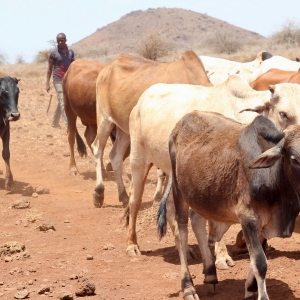The Stream, May 15: Chance of El Niño Drops as Pacific Cools
The Global Rundown
Australia’s meteorological department says there is less of a chance of an El Niño weather event this year due to cooling of the Pacific. Bosnia declares a state of emergency as floods sweep through parts of the country. Farmers in Zimbabwe turn to drip irrigation and vegetable crops as rain-dependent maize harvests fail. North Korea state media announces record-low spring rainfall. Water shortages and damaged infrastructure obstruct healthcare in cyclone-hit Mozambique.
“I don’t know how I’ll look after this baby if I can’t eat and I don’t have anything for her. These two [cloth] wrappers and the clothes I’m wearing are all we have, the rest went with the water.” –Louisa Dorothea Jerafi, a Mozambican mother who gave birth a week after Cyclone Kenneth made landfall. Aid agencies warn that pregnant and nursing mothers may be at greatest risk as Mozambique reels from back-to-back cyclones. Much of the country’s healthcare system is devastated, and food and water shortages continue to impact the population. Al Jazeera
Latest WaterNews from Circle of Blue
HotSpots H2O: Eleven Killed in Kenya Water Quarrel — A clash over water left eleven people dead and two injured in Marsabit County, Kenya, last week. The deaths are the latest in a string of water-related violence in the eastern African country in recent years.
What’s Up With Water – Only A Third Of The Planet’s Major Rivers Are Still Free-Flowing — This week’s edition of What’s Up With Water includes coverage on a worldwide analysis of major rivers, falling water levels in Afghanistan, and the aftermath of Cyclone Fani in India.
By The Numbers
50 percent Chance of an El Niño weather pattern developing this year, down from a previous prediction of 70 percent, according to Australia’s Bureau of Meteorology (BOM). The department said a recent cooling of the Pacific Ocean caused the likelihood to decrease. Reuters
54.4 millimeters (2.14 inches) Rainfall so far this year in North Korea, based on information from the country’s state-run media. A local news station reported that the amount is 42 percent of normal, and another agency said that “revolutionary drought damage prevention measures” are needed to stave off deepening hunger in the country. The Guardian
In context: North Korea Faces Drought Following Months of Low Rainfall.
Science, Studies, and Reports
Farmers in Zimbabwe are reporting success with drip irrigation and vegetable-growing, recent initiatives that began after erratic rainfall led to poor maize harvests. The approaches are known as “climate-smart agriculture,” and are helping farmers adapt to a warming, unpredictable climate. Reuters
On the Radar
Severe rain and floods swept through parts of Bosnia on Tuesday, prompting the country to declare a state of emergency. Water and electrical outages have been reported in some areas. Officials warn that the flooding may spread to nearby Croatia and Serbia. Reuters

Kayla Ritter is a recent graduate of Michigan State University, where she studied International Relations and Teaching English to Speakers of Other Languages. She is currently based in Manton, Michigan. Kayla enjoys running, writing, and traveling. Contact Kayla Ritter






Leave a Reply
Want to join the discussion?Feel free to contribute!